What a dietitian can “bring to the table”

Allyson Roelofs
| 3 min read

Today has been chosen as this year’s Registered Dietitian Day. First created in March 2008, The Academy of Nutrition and Dietetics annually picks one day to remind everyone that the best source of practical, affordable and accurate nutrition information is a registered dietitian (RD).
According to the Academy, Registered Dietitian Day commemorates the dedication of dietitians, during National Nutrition Month® and all year long, as advocates for advancing the nutritional status of Americans and people around the world. A day celebrating dietitians may lead you to wonder what qualifies them as experts and what can they do for you?
“Why should I trust a dietitian to be an expert source for nutrition advice?”
A registered dietitian must earn their credentials by meeting a number of academic and professional requirements:
– Earn a bachelor’s degree with course work approved by the Academy of Nutrition and Dietetics Accreditation Council for Education in Nutrition and Dietetics (ACEND). Coursework typically includes food and nutrition sciences, foodservice systems management, business, economics, computer science, sociology, biochemistry, physiology, microbiology and chemistry.
– Complete an accredited, supervised practice program at a health-care facility, community agency or foodservice corporation.
– Pass a national examination administered by the Commission on Dietetic Registration.
– Complete continuing professional educational requirements to maintain registration.
– Complete an accredited, supervised practice program at a health-care facility, community agency or foodservice corporation.
– Pass a national examination administered by the Commission on Dietetic Registration.
– Complete continuing professional educational requirements to maintain registration.
“How can a dietitian improve my health?”
RDs work throughout the community in hospitals, schools, public health clinics, nursing homes, fitness centers, food management, food industry, health insurance, universities, research and private practice. You may want to consider consulting with an RD if any of the following 5 reasons apply to you:
1. You have been diagnosed with a chronic disease. A chronic disease is a long-lasting condition that can be controlled but not cured. According to the CDC, chronic disease is the leading cause of death and disability and in the US accounts for 70% of all deaths. Examples include diabetes, heart problems and high blood pressure. A dietitian can help with prevention and effective control by working with you to change your eating plan without compromising taste or nutrition.
2. You are thinking of having or have had gastric bypass surgery. Although the CDC estimates that one-third of US adults are obese, bariatric surgery is not a quick fix. In the January 2012 issue, Today’s Dietitian explains that surgery is little more than a tool that works best when combined with diet and lifestyle changes. Due to drastically reduced portion sizes and the increased risk for developing food intolerances, a dietitian will work with you and your physician to design an eating plan focused around your new needs.
3. You or someone you know has an eating disorder. The National Eating Disorders Association recommends that treatment includes psychological therapy in addition to meeting medical and nutritional needs. A dietitian can assist in cases of anorexia, bulimia and binge eating by providing counseling, education and assistance with meal planning.
4. You are pregnant or trying to get pregnant. Nutritional needs change with pregnancy and a dietitian can help ensure that you are getting enough of the key nutrients. These nutrients include folic acid for prevention of spinal cord related birth defects, iron to avoid complications of anemia and calcium for the baby’s developing teeth, bones, heart, nerves and muscle.
5. You want to improve your performance in sports. To help you achieve your fitness goals, a dietitian can develop a plan to meet your nutritional needs for before, during and after exercise.
If you would like more information on what a dietitian does, how you can get in touch with one or if you would like to become one yourself, visit www.eatright.org.
Photo credit: Academy of Nutrition and Dietetics





